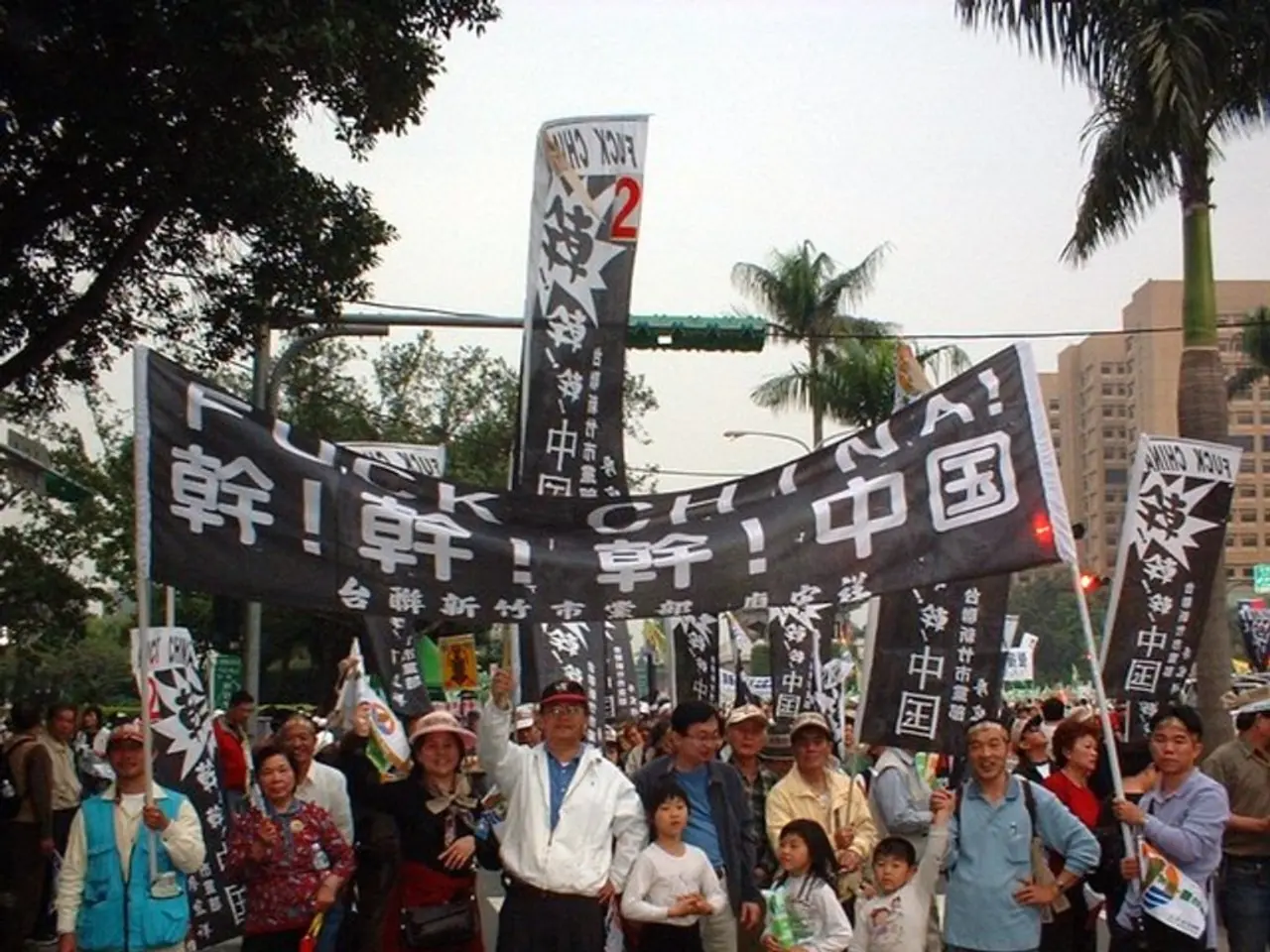No More Rainbow over Bundestag? Are CSD Parades Losing Their Sheen?
Have the CSD parades expanded beyond their dimensions?
This year, for the first time during the Christopher Street Day (CSD), the rainbow flag will not be showcased on the Reichstag building. A significant shift indeed! Meanwhile, right-wing extremists have set their sights on Pride parades, intensifying the question: is society experiencing a reverse in diversity acceptance?
June is typically Pride month, a time when vibrant CSD celebrations have graced German cities for years. With demonstrations and colorful parades, these events commemorate, celebrate, and challenge the first known uprising by queer minorities against police brutality in New York's Christopher Street.
Dating back years, CSD has been a staple in Germany's social and political calendar. However, the hoisting of the rainbow flag on the Reichstag construction has lost its signal: for diversity, self-determination, and an open society. This year, it seems, that signal will cease.
Politics Where is the Solidarity for Queer Community? Fly the Flag, Bundestag! As per Bundestag President Julia Klöckner, the Bundestag will not display the flag on July 26, the day of the Berlin CSD parade. Instead, the Pride flag was displayed alongside federal and European flags on the Reichstag in May 17. A CDU politician's reasoning: a political statement had already been made back in May 1990, upon the WHO removing homosexuality from its diagnostic manual for diseases. A CDU spokesperson corroborated this via ntv.de.
"That's a disastrous signal," criticizes Alexander Irmisch, the SPD politician and local organizer of the CSD in Regensburg. The parade in Regensburg on July 5 can't take place as it did before due to an "abstract threat situation." Although there are no specific threat findings for the event, authorities claim full protection cannot be guaranteed at all times and places "due to the escalating queer hostility," confides Irmisch to ntv.de. In this "alarming backdrop," the eventual rescheduling was indeed necessary to ensure "an increase in participant and deployment force safety," utters Irmisch. At such a delicate time, the LGBTQIA+ community desperately requires politics' solidarity. "This is also about signs and symbols."
"Bending to Right-wing Forces"
In recent years, the CSD participation from the queer rainbow network of the Bundestag administration served as a symbol—besides the hoisting of the rainbow flag on the Reichstag. However, that will be absent this year too. The newly appointed Bundestag director, Paul Göttke, imposed a ban at the start of the week, citing the "internal impartiality obligation."
"Individual or group employees of the Bundestag administration are, of course, free to participate in such gatherings outside of work," asserts Klöckner’s spokesperson. Verdi chief Frank Werneke condemned the move as caving in to right-wing tendencies and expressed the expectation that the leadership revises the "de facto demonstration ban."
The federal queer commissioner, Sophie Koch, also expressed disapproval. "If the participation of such employee networks is obstructed or made more challenging, I consider that a false and unnecessary signal—especially at this time," she informed the German Press Agency.
Panorama Queer-Hate from the Right "Oppression always starts with minorities but ends indiscriminately" The decision by the Bundestag leadership was "a political and moral failure on all fronts," opined Left Party MPs in a letter to the parliamentary president. The Greens urged Klöckner to hoist the flag "for the freedom and security of queer people." Members of the SPD parliamentary group also implored Klöckner to permit the queer group of the Bundestag administration to join this year's Berlin CSD. Particularly perplexing was the alleged neutrality justification, as stated in the letter obtained by dpa. After all, the event prioritizes standing up for the values enshrined in the German Constitution: respect for human dignity and the prohibition of discrimination.
CSD Attack in Wernigerode Foiled?
The Bundestag's decisions come at a time when anti-queer sentiments are surging across Germany. As per the Federal Criminal Police Office, 1,765 cases of queer-related offense, along with 1,152 cases against trans or non-binary individuals, were reported in 2024 (representing a 18% and 35% increase, respectively). "A heart-wrenching peak in queer-hostile hate crime," laments Andre Lehmann, board member of the LSVD+ association Queer Diversity.
Recently, threatened individuals in a diversity festival in Bad Freienwalde were attacked with hammers and wooden planks in Brandenburg. At least two people were injured.
Politics Attack on Family Festival Anonymous assailants attacked an anti-right rally in Brandenburg. A 20-year-old from nearby Saxony-Anhalt is being investigated for planning an attack on the Christopher Street Day in Wernigerode, according to the "taz."
Right-wing extremists have registered a counter-demonstration to the Pride parade in Berlin's Marzahn-Hellersdorf district for the upcoming weekend. Information from Tagesspiegel revealed that the neo-Nazi group "Deutsche Jugend voran" (DJV) is responsible for the counter-action.
CDU Colleagues Show the Flag
However, CDU politician Klöckner's colleagues Karin Prien and Kai Wegner are taking a contrary stance. As in previous years, the Federal Ministry of Family Affairs will partake in the Berlin CSD. "Our ministry will also be represented this year with its own vehicle [...], "said ministry head Prien to taz." This is an essential sign for the recognition and respect for diversity within our society."
Berlin's governing mayor, too, has announced his participation in the capital's CSD. "Berlin is the city of diversity and tolerance," says Senate spokeswoman Christine Richter. Consequently, the rainbow flag will be hoisted in Berlin on July 26—also at the Red City Hall, "in the presence of the governing mayor."
Source: ntv.de
Enrichment Data:- In 2025, the Bundestag administration pulled out of official participation in the Berlin CSD, Germany's largest LGBTQ+ pride event, following a controversial ban on flying Pride flags on the Bundestag building.- This decision drew widespread criticism from various political figures and LGBTQ+ advocates, with many arguing that the event should not be politicized—rather, it should offer a space for celebration and solidarity.- Sophie Koch, the Federal Queer Commissioner, criticized the move, calling it a wrong and unnecessary signal, particularly considering the current social climate.- Frank Werneke, head of the union Verdi, denounced the ban as a societal regression and described the Bundestag administration's action as "giving in to right-wing tendencies."- Julia Klöckner, who announced that the rainbow flag would only be flown on the International Day Against Homophobia (May 17) but not for the Berlin CSD, generated controversy earlier that year when the rainbow flag was flown on the Bundestag building for the first time. This limitation on the flag's display is seen as a step backward in visibility for LGBTQ+ rights within Germany's federal parliament.- In summary, the Bundestag's decision reflects a backlash against public queer visibility in government spaces, which has provoked significant criticism and is viewed by many as a concession to right-wing pressures and a setback on the LGBTQ+ rights movement in Germany.
- The Bundestag's decision to not fly the Pride flag during the Berlin CSD has been heavily criticized by various political figures and LGBTQ+ advocates, with many arguing that the event should not be politicized but offer a space for celebration and solidarity.
- Sophie Koch, the Federal Queer Commissioner, has criticized the move, calling it a wrong and unnecessary signal, particularly considering the current social climate in Germany.
- Frank Werneke, head of the union Verdi, denounced the ban as a societal regression and described the Bundestag administration's action as "giving in to right-wing tendencies."
- The limitation on the rainbow flag's display in the Bundestag is seen as a step backward in visibility for LGBTQ+ rights within Germany's federal parliament, reflecting a backlash against public queer visibility in government spaces.





